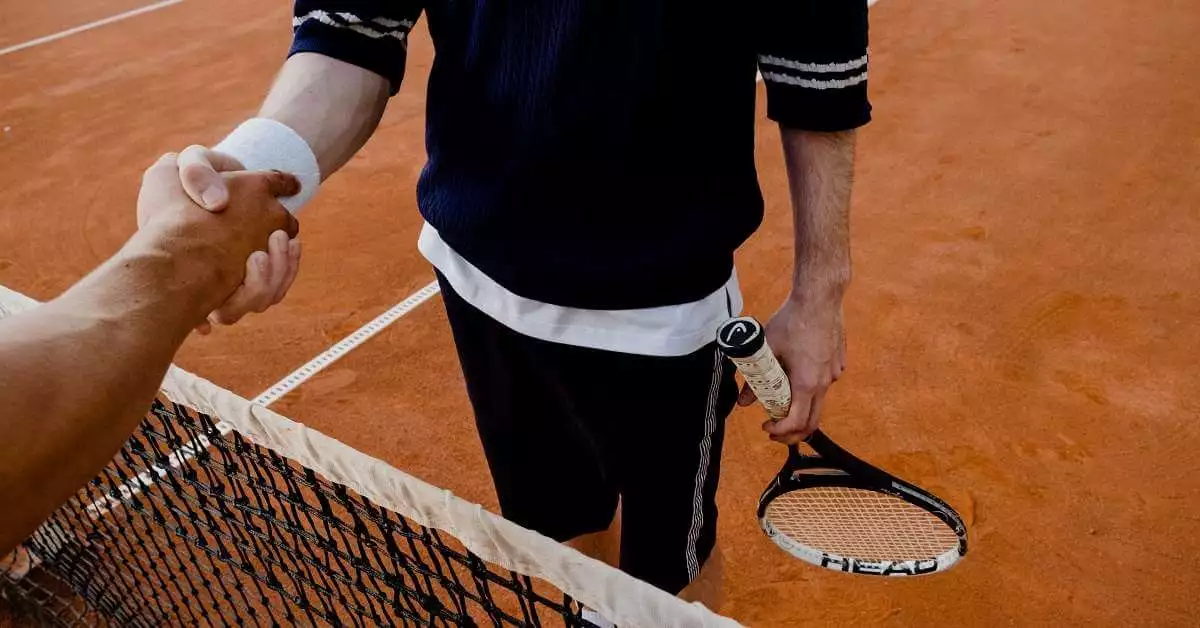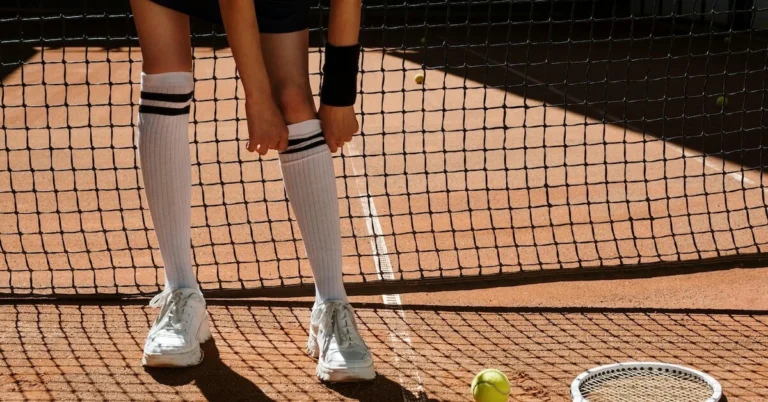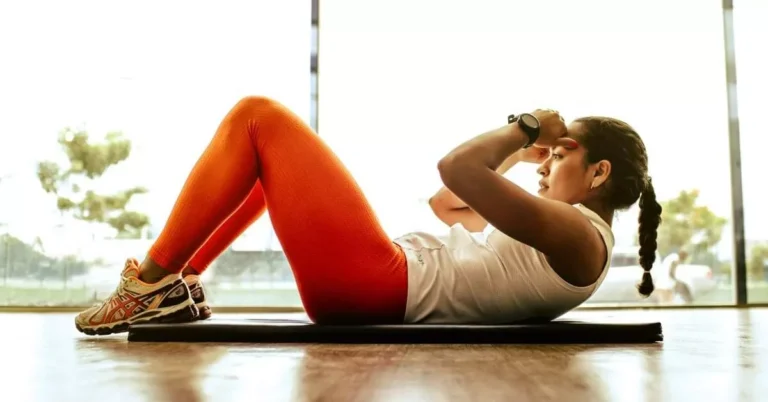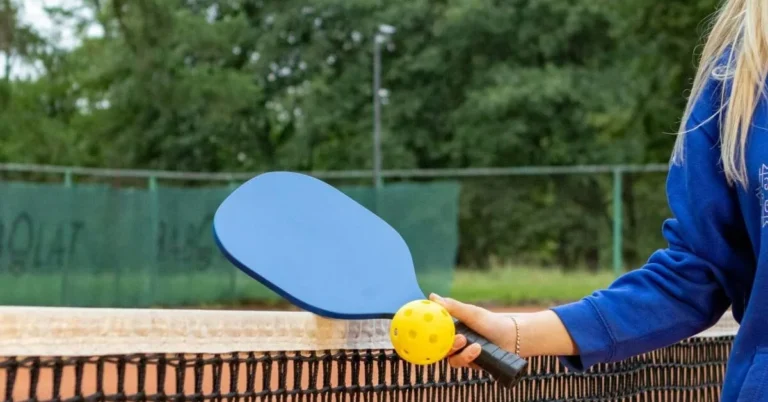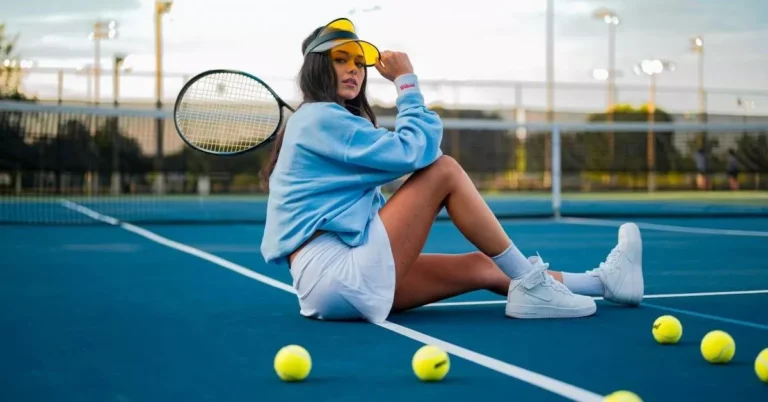Are you new to playing tennis and unsure about the tennis etiquette and sportsmanship rules? Or are you a seasoned player who wants to refresh their knowledge on the topic? Either way, understanding the rules of tennis etiquette and sportsmanship is essential for all players. Not only does it create a positive and respectful environment on the court, but it also enhances the overall experience of playing tennis.
Tennis etiquette refers to the unwritten rules of behavior that players should follow on the court. These rules are not only about showing respect towards your opponent but also towards the game itself. For instance, players should arrive on time for their matches, avoid making excessive noise during play, and follow the dress code. Additionally, players should be mindful of their behavior towards their opponents, including congratulating them on good shots, refraining from cheating, and not showing anger or frustration towards them.
Tennis etiquette and sportsmanship refers to the player’s attitude towards the game and their opponent. It’s about showing respect, fair play, and graciousness on and off the court. Players should always strive to play their best while maintaining a positive attitude, even when things don’t go their way. Furthermore, players should acknowledge their opponent’s good shots and avoid celebrating excessively after winning a point or match. By following these rules, players can maintain a high level of sportsmanship and create a positive environment for all players.
Tennis Etiquette and Sportsmanship
As a tennis player, it’s important to not only play well but also to demonstrate good sportsmanship and proper tennis etiquette on and off the court. Here are some guidelines to follow to ensure that you are being respectful to your opponent and playing the game fairly.
The 9 Do’s and Dont’s of Tennis Etiquette and Sportsmanship
Playing fair and showing respect to your opponent are essential components of good sportsmanship. Here are some dos and don’ts to keep in mind:
DO:
- Play by the rules and follow proper tennis etiquette
- Show respect to your opponent and their abilities
- Shake hands with your opponent before and after the match
- Keep a positive attitude, even when things don’t go your way
- Congratulate your opponent on a good shot or game
DON’T:
- Engage in negative behavior, such as throwing your racquet or complaining about your opponent
- Gloat or show off after a win
- Talk trash or smack talk your opponent
- Cheat or engage in unsportsmanlike conduct
Unwritten Rules of Tennis
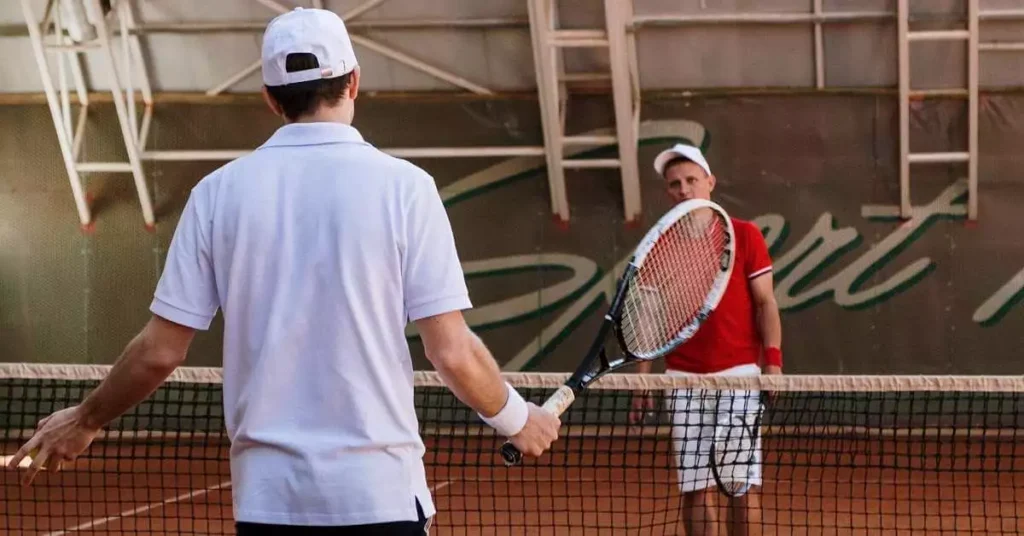
In addition to the official rules of tennis, there are also some unwritten rules that players are expected to follow. These rules are not always explicitly stated but are still important to observe to maintain good tennis etiquette. Here are some examples:
- Don’t call balls out unless you are sure they are out
- If a ball from another court comes onto your court, stop play and return the ball to the other court
- Don’t distract your opponent during their serve or play
- Don’t take excessively long breaks between games or sets
Silence Your Phone
One aspect of proper tennis etiquette is to silence your phone during a match. This not only avoids distractions for you and your opponent but also shows respect for the game and your opponent’s time.
Warmups
During warmups, players should follow the official rules of the International Tennis Federation (ITF) and the United States Tennis Association (USTA). A warmup should be no longer than five minutes unless otherwise decided by organizers. Players should keep time and avoid abusing the length of the warmup period.
Tennis Etiquette and Sportsmanship: Handling the Game
When playing tennis, it is important to not only focus on your own performance but also to adhere to proper tennis etiquette and sportsmanship rules. Use the following tips for handling the game:
Line Calls and Fair Play
One of the most important aspects of tennis is fair play. Always make sure to call the ball in or out accurately, even if it means losing the point. Cheating by deliberately making incorrect line calls is not only unsportsmanlike but also goes against the fundamental principles of the game.
Dealing with Frustration
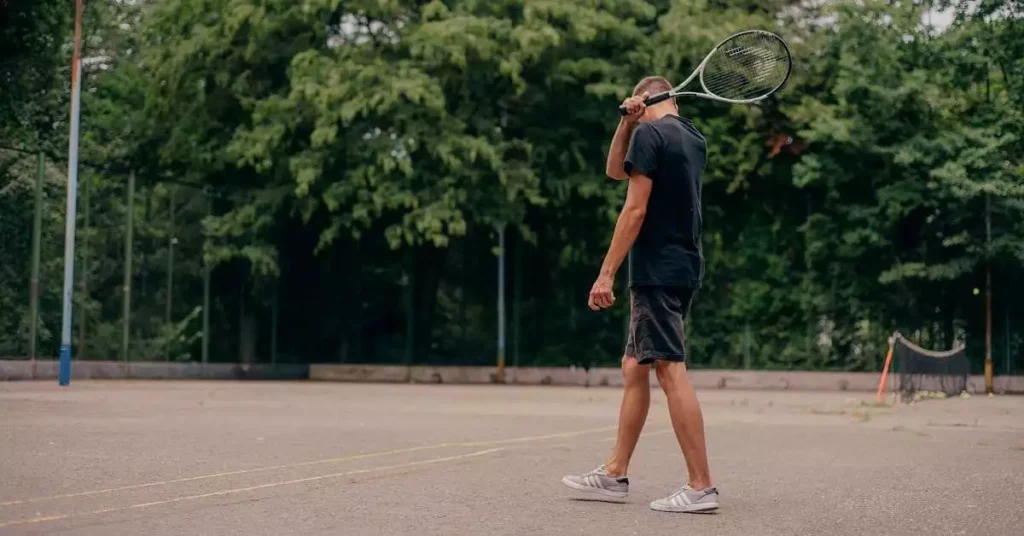
Tennis can be a frustrating game, especially when things are not going your way. However, it is important to stay positive and not let your frustration affect your behavior on the court. Avoid throwing your racket, shouting, or engaging in any other negative behavior. Instead, take a deep breath, refocus, and continue playing to the best of your ability.
Verbal Distractions
Verbal distractions, such as talking or making noise during your opponent’s serve, are not only rude but also against the rules of the game. Make sure to remain quiet during your opponent’s serve and wait until after the point is over to speak.
Visual Distractions
Visual distractions, such as waving your arms or jumping up and down, are also not allowed during play. Avoid any unnecessary movements that could distract your opponent and disrupt the flow of the game.
Targeting Your Opponent
Intentionally hitting the ball at your opponent is not only unsportsmanlike but also dangerous. Always aim your shots away from your opponent and be mindful of your surroundings to avoid accidentally hitting anyone.
Retrieving Balls from Nearby Courts
When retrieving balls from nearby courts, make sure to wait until the point is over and the players on the other court are not in the middle of a shot. Be respectful of other players and avoid disrupting their game.
Tennis Etiquette and Sportsmanship: Court Etiquette
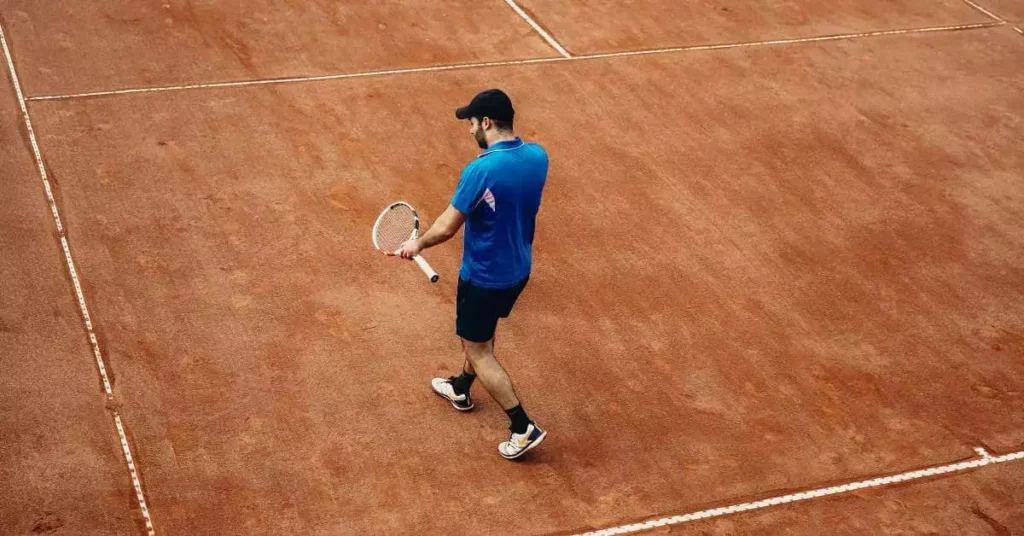
When playing tennis, it’s important to follow proper court etiquette to ensure a respectful and fair playing environment for everyone.
Entering and Leaving a Court
When entering a court, wait until the players have finished the point before walking onto the court. If the players are in the middle of a point, wait until the point is over before entering the court. When leaving the court, wait until the players have finished the point before walking off the court. If you need to cross a court to get to your court, wait until the players have finished the point before crossing the court.
Keeping the Ball and Court
When playing a match, it’s important to keep the ball and court in good condition. If you’re playing with a new can of balls, open the can before the match so that the balls can acclimate to the temperature and pressure of the court. During the match, make sure to pick up the balls after each point and keep them in a ball holder or basket. If a ball goes out of play, retrieve it as quickly as possible and return it to the court.
To keep the court in good condition, make sure to avoid dragging your feet or sliding on the court during play. If you need to towel off, do so off the court and away from the players. If you need to adjust the net, do so quickly and without disrupting play.
Tennis Etiquette and Sportsmanship: Role of Spectators and Officials
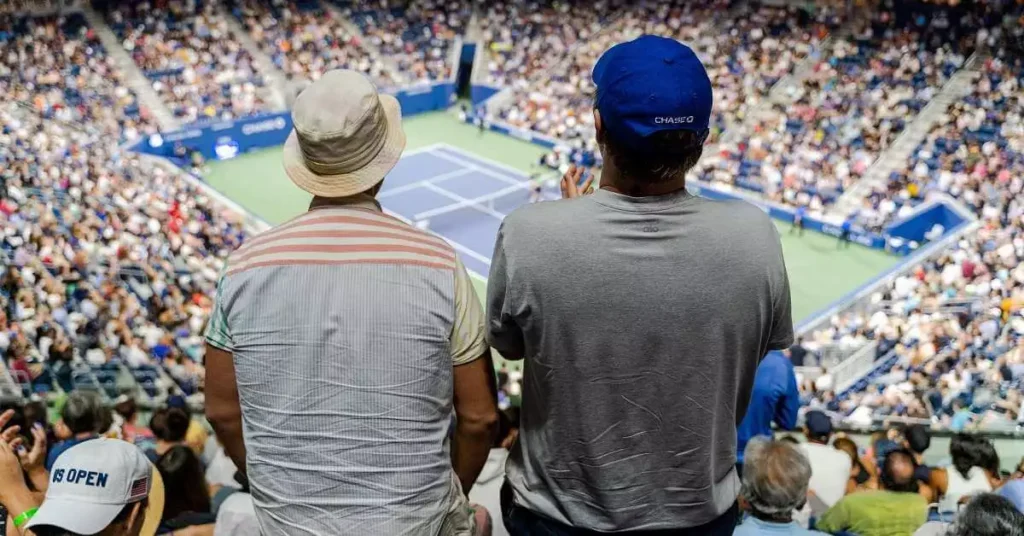
As a spectator, you play an important role in maintaining a positive and respectful environment during a tennis match. Your behavior can affect not only the players but also other spectators and officials.
Spectator Tennis Etiquette
- Be respectful: Cheer for good shots and rallies, but avoid heckling or taunting the players. Remember that tennis is a game of skill and strategy, and players are doing their best to win.
- Keep quiet during points: Tennis requires concentration, and any noise or distraction can be a hindrance to the players. So, please refrain from talking, using your cell phone, or making unnecessary noise during points.
- Stay in your seat: Moving around during points or games can be distracting to the players. So, please stay in your seat until the end of the game or changeover.
- Respect the officials: The officials are there to ensure that the match is played fairly and according to the rules. Please do not argue with them or question their decisions. If you have a concern, you can politely ask for clarification between games or at the end of the match.
Role of Officials
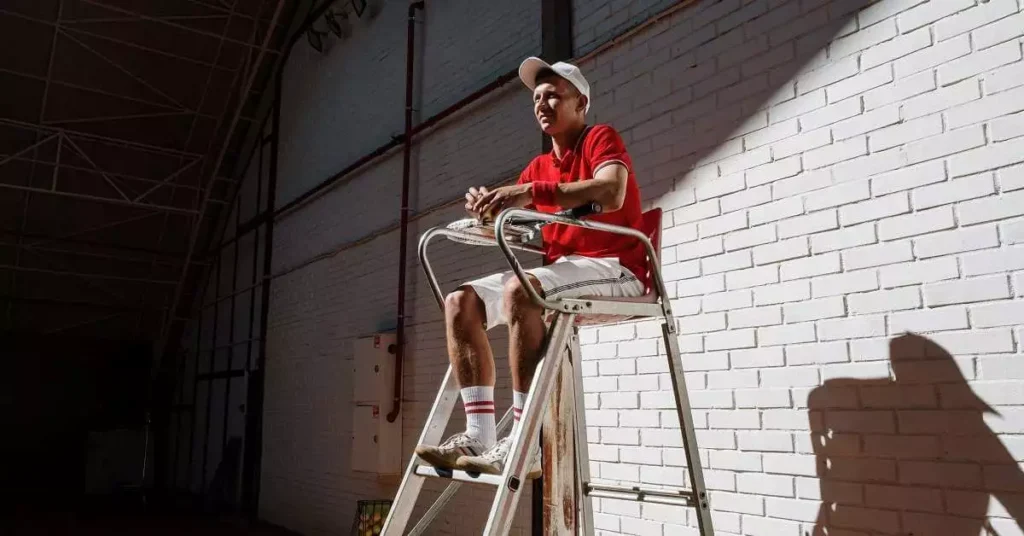
The officials play a crucial role in ensuring that the match is played fairly and according to the rules. Here are some of their responsibilities:
- Enforce the rules: The officials are responsible for enforcing the rules of tennis, including line calls, foot faults, and hindrances. Their decisions are final and should be respected by all players and spectators.
- Maintain order: The officials are also responsible for maintaining order on the court. They can issue warnings or penalties for unsportsmanlike conduct, coaching, or hindrance.
- Ensure safety: The officials are responsible for ensuring the safety of the players and spectators. They can stop the match if there is a safety concern, such as inclement weather or an injured player.
Tennis Etiquette and Sportsmanship: Dress Code and Equipment
When it comes to tennis etiquette, following the dress code is just as important as displaying good sportsmanship. The dress code for tennis varies depending on the tournament or tennis club, but there are some general guidelines that you should follow.
Dress Code for Players
At most tennis clubs and tournaments, players are required to wear tennis-specific clothing. This includes tennis shoes, shorts or skirts, and a collared shirt. Clothing that is too revealing or offensive is not allowed. For example, men are not allowed to wear tank tops or shirts with offensive language, and women are not allowed to wear overly revealing or tight clothing.
At Wimbledon, the oldest and most prestigious tennis tournament in the world, the dress code is even stricter. Players must wear all-white clothing, including undergarments and shoes. This dress code has been in place since the tournament’s inception in 1877 and is strictly enforced.

Equipment
In addition to following the dress code, players must also have the proper equipment. This includes a tennis racket, tennis balls, and a tennis bag to carry everything in. The tennis racket must meet certain specifications, such as having a maximum length of 29 inches and a maximum width of 12.5 inches.
It is also important to note that players should only bring the equipment they need onto the court. This means not bringing extra rackets or bags onto the court, as it can be distracting to other players.
Tennis Etiquette and Sportsmanship: The Spirit of the Game
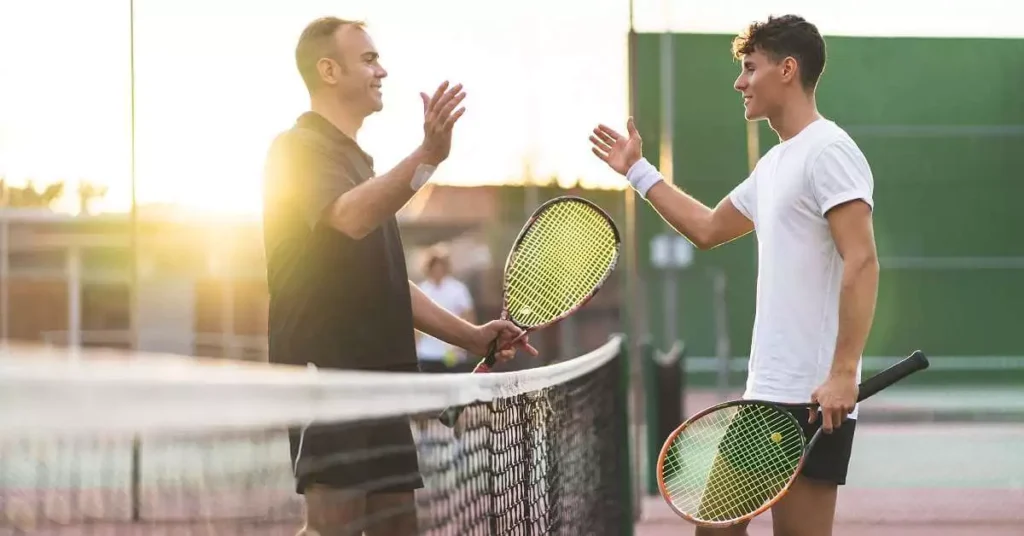
As a tennis player, it is important to remember that tennis is not just about winning or losing, but also about embodying the spirit of the game. Here are some key aspects of the spirit of the game that you should keep in mind:
Encouraging Diversity and Passion
Tennis is a sport that is enjoyed by people from all walks of life, and it is important to encourage diversity and passion in the game. Whether you are playing with friends, coaches, or teammates, it is important to respect and appreciate the unique perspectives and experiences that each person brings to the court. The United States Tennis Association (USTA) recognizes the importance of diversity and has implemented initiatives to promote diversity and inclusion in tennis.
Credit and Recognition
Tennis is a team sport, and it is important to give credit and recognition to your teammates for their contributions to the game. Whether it is a well-placed serve or a perfectly executed volley, acknowledging your teammate’s efforts can go a long way in building team morale and camaraderie. Similarly, it is important to recognize your opponents for their skill and sportsmanship, regardless of the outcome of the game.
To embody the spirit of the game, it is important to stay focused, try your best, and maintain good tennis etiquette and sportsmanship throughout the game. This means respecting the rules of the game, playing within the designated area, and avoiding distractions that can interfere with game play.
FAQ
What is proper tennis etiquette?
Tennis has a set of rules and guidelines that players should follow to maintain a positive and respectful atmosphere. Proper tennis etiquette includes shaking hands with your opponent before and after the match, waiting for your opponent to be ready before serving, and calling the ball out if it lands outside the lines. Additionally, players should avoid making unnecessary noise or movements that could distract their opponent.
What are some unwritten rules in tennis doubles matches?
In doubles matches, players should communicate with their partner to avoid confusion and collisions. Serving order should also be established before the match begins, and players should be aware of their partner’s strengths and weaknesses. It is also considered good etiquette to give your opponent a chance to retrieve the ball before hitting it again.
Which of the following is considered bad tennis etiquette?
Talking during points, throwing your racket, and arguing with the umpire are all considered bad tennis etiquette. Additionally, players should avoid celebrating excessively after winning a point or making derogatory comments towards their opponent.
What are some characteristics of good sportsmanship in tennis?
Good sportsmanship in tennis includes showing respect towards your opponent, following the rules of the game, and accepting the outcome of the match with grace. Players should also avoid making excuses or blaming external factors for their performance.
What is the proper behavior when waiting for a tennis court?
When waiting for a tennis court, players should be respectful of those who are currently playing and avoid distracting them. It is also considered good tennis etiquette to wait patiently and avoid hovering around the court. If there is a sign-up sheet for court reservations, players should follow the established rules and not attempt to cut in line.
Have you experienced good or bad tennis etiquette on the court? Share your thoughts and experiences in the comments below. Let’s learn from each other and promote a positive tennis culture both on and off the court!

